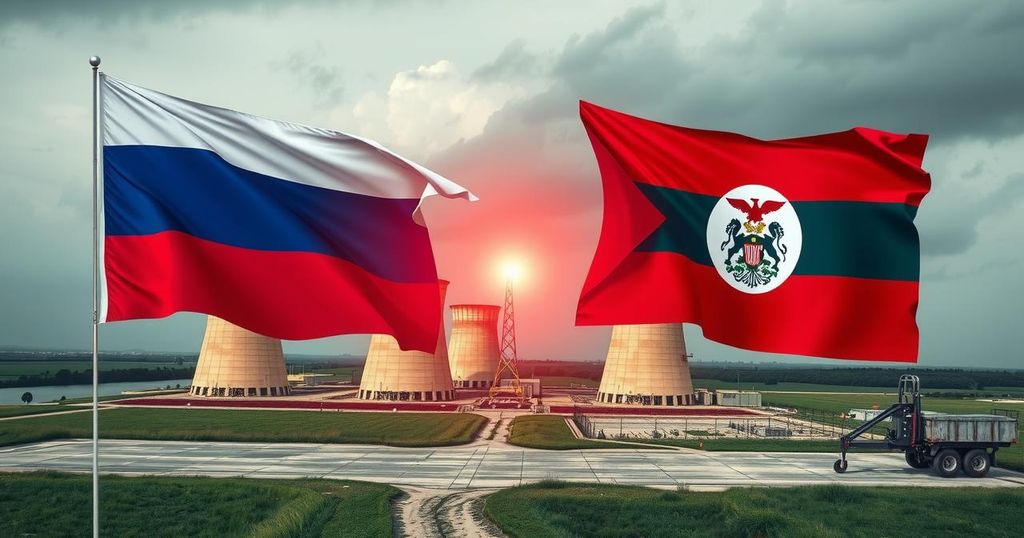Burundi has signed an agreement with Russia for nuclear cooperation aimed at developing Burundi’s nuclear infrastructure for peaceful energy use. The deal includes safety regulations, research, and radioisotope production. Additionally, Burundi’s leaders are exploring other African nuclear ventures, emphasizing a regional commitment to enhanced energy security through nuclear technology.
Burundi has formalized an agreement with Russia to collaborate on nuclear cooperation. This memorandum of cooperation (MoC) was signed during the Russia-Africa Economic and Humanitarian Forum in St. Petersburg by Burundi’s Minister of Foreign Affairs and Development Cooperation, Albert Shingiro, and Rosatom’s Director General, Alexei Likhachev. The agreement outlines initiatives aimed at establishing and enhancing Burundi’s nuclear framework, covering areas such as nuclear and radiation safety regulations, research for peaceful atomic energy, and the production and application of radioisotopes for various sectors including industry, medicine, and agriculture. Additionally, a joint coordination committee will be formed to facilitate expert exchanges and the sharing of scientific and technical information, along with the supply of pertinent equipment and resources.
Prior to signing this agreement, President Evariste Ndayishimiye led a delegation to the Leningrad nuclear power plant to explore advanced nuclear technology. Minister Ibrahim Uwizeye described the visit as instrumental for the Burundi-2040 project, which aims to enhance energy security and independence through diverse energy sources. Burundi has been engaged in nuclear energy discussions since signing its first Country Programme Framework with the International Atomic Energy Agency (IAEA) in 2016, and has since progressed towards legislation for safe and peaceful nuclear energy use. This discourse is echoed among other African nations at the forum, indicating a regional interest in developing nuclear capabilities.
During the forum, President Vladimir Putin indicated that Russia has prepared cooperative documents in nuclear energy for various African countries, further demonstrating a commitment to fostering relationships in this strategic sector. Reports came forth regarding potential agreements with Zimbabwe and upcoming uranium extraction projects in Tanzania. In contrast, Egypt is poised to become a key player in nuclear energy with ongoing construction by Rosatom of the El Dabaa nuclear plant, a significant step for the region’s energy landscape.
This collaboration heralds a significant stride for Burundi in nuclear development, aligning with broader continental movements toward harnessing nuclear technologies for peaceful purposes. As nations explore these opportunities, it is vital that frameworks ensure safety and sustainability in energy production.
The agreement between Burundi and Russia highlights a growing trend of African nations engaging with Russia on nuclear energy and technology, particularly for peaceful applications. This follows Burundi’s increasing interest in developing a nuclear energy agenda, as evidenced by earlier collaborations with the International Atomic Energy Agency (IAEA) and legislative efforts focused on nuclear safety since 2016. The context of the Russia-Africa Economic and Humanitarian Forum provides a platform for these discussions, encouraging cooperation among multiple African states regarding nuclear energy projects. Countries like Egypt, South Africa, Ethiopia, and Zimbabwe are also actively pursuing nuclear capabilities, indicating a broader commitment across the continent towards utilizing nuclear energy as a sustainable power source.
In conclusion, the MoC signed between Burundi and Russia signifies a pivotal development in Burundi’s aspirations for energy enhancement through nuclear technology. This agreement not only facilitates the establishment of nuclear infrastructure but also underscores a larger movement within Africa towards collaborative nuclear projects. With ongoing discussions involving multiple nations and Russia’s strategic investments in nuclear energy, Africa may be on the brink of significant advancements in energy security and technological capacity. Continued focus on safe applications and regulatory frameworks will be crucial as these initiatives unfold.
Original Source: world-nuclear-news.org






